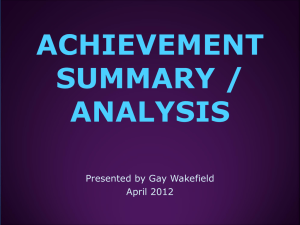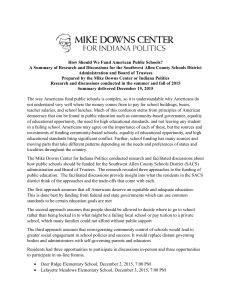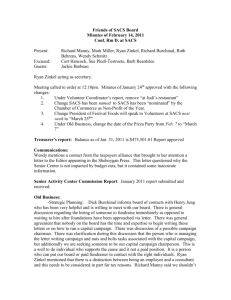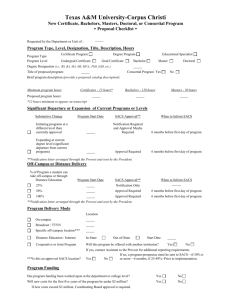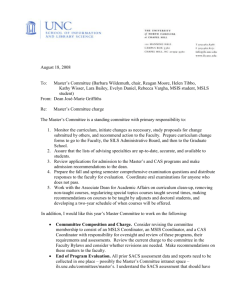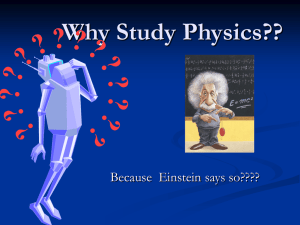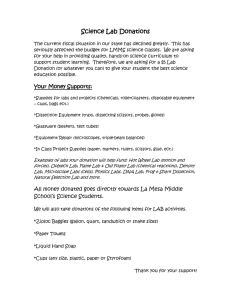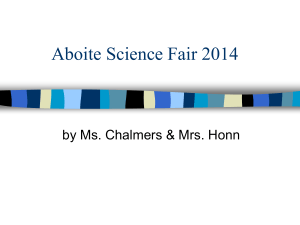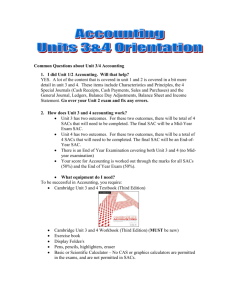Discussion and Debate
advertisement
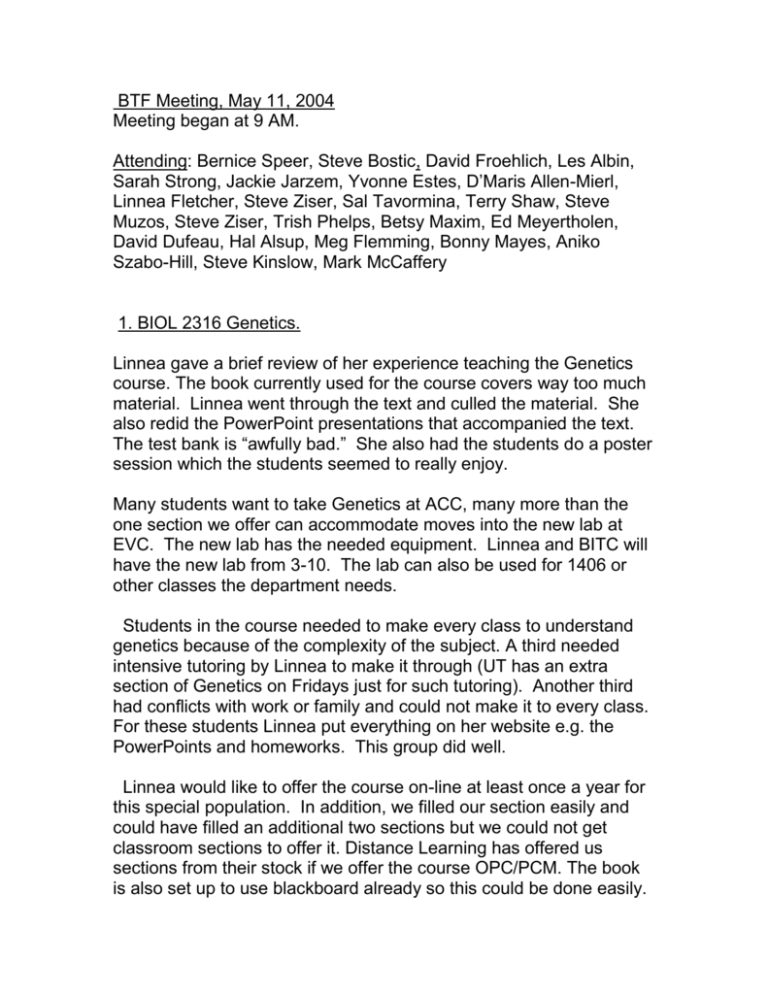
BTF Meeting, May 11, 2004 Meeting began at 9 AM. Attending: Bernice Speer, Steve Bostic, David Froehlich, Les Albin, Sarah Strong, Jackie Jarzem, Yvonne Estes, D’Maris Allen-Mierl, Linnea Fletcher, Steve Ziser, Sal Tavormina, Terry Shaw, Steve Muzos, Steve Ziser, Trish Phelps, Betsy Maxim, Ed Meyertholen, David Dufeau, Hal Alsup, Meg Flemming, Bonny Mayes, Aniko Szabo-Hill, Steve Kinslow, Mark McCaffery 1. BIOL 2316 Genetics. Linnea gave a brief review of her experience teaching the Genetics course. The book currently used for the course covers way too much material. Linnea went through the text and culled the material. She also redid the PowerPoint presentations that accompanied the text. The test bank is “awfully bad.” She also had the students do a poster session which the students seemed to really enjoy. Many students want to take Genetics at ACC, many more than the one section we offer can accommodate moves into the new lab at EVC. The new lab has the needed equipment. Linnea and BITC will have the new lab from 3-10. The lab can also be used for 1406 or other classes the department needs. Students in the course needed to make every class to understand genetics because of the complexity of the subject. A third needed intensive tutoring by Linnea to make it through (UT has an extra section of Genetics on Fridays just for such tutoring). Another third had conflicts with work or family and could not make it to every class. For these students Linnea put everything on her website e.g. the PowerPoints and homeworks. This group did well. Linnea would like to offer the course on-line at least once a year for this special population. In addition, we filled our section easily and could have filled an additional two sections but we could not get classroom sections to offer it. Distance Learning has offered us sections from their stock if we offer the course OPC/PCM. The book is also set up to use blackboard already so this could be done easily. Passed unanimously. 2. Dr. Kinslow on SACS. Dr. Kinslow came to the meeting to address the department’s concerns and answer our questions about SACS. The administration has not made a final decision on Biology but does need to address the SACS consultant’s concerns. The consultant is head of the SACS consulting network and it is a very good move to have her go over our files but ACC will not blindly follow her recommendations. Dr. Kinslow realizes it can be distressing and somewhat insulting to have one’s credentials questioned. SACS has become extremely focused on credentials and we must answer their concerns. ACC will have to hire fewer faculty “by exception” The college will work with instructors to bring their credentials into line with current SACS requirements. No full-time faculty will lose their jobs. Bernice reviewed the results of the survey of colleges reviewed by SACS in December. No school contacted required 18 hours in human anatomy to teach anatomy. Many just required a Master’s in Biology. Dr. Kinslow was appreciative of Biology’s efforts to research the criteria used by other colleges reviewed by SACS last December. He was asked why the department rather than the college had to gather evidence to defend its faculty. Dr. Kinslow feels it is better for faculty in the field, who will know what questions to ask, rather than administrators whose specialty is not in Biology to make the arguments. One of the problems with SACS reviews is the malleability of the visiting team’s judgments. One member of a team can declare a faculty member in full compliance with SACS guidelines while another team member insists the instructor is not. The team members then discuss it and come to a consensus. Some teams will have a much broader interpretation of credentials than other teams. There is not a lot of consistency. Nor are their reports the final word. One school reviewed by SACS was told to adhere to the 18 hours of Human Anatomy criterion, but was able to change the team’s decision after several weeks of discussion and by documenting that other schools did not have this requirement. It takes years to effect changes at SACS so there is not enough time to get SACS to rethink it credentialing criteria before the next visit. The visiting teams are composed of faculty members from other SACS schools and from a variety of disciplines. We don’t get to choose. The team that visited ACC did not have a biologist on the team. The department expressed frustration with the lack of communication between the ACC SACS group and the faculty. Instructors were told to submit questions for SACS to Carrie Sowell or Lynn Beaman and they would ask SACS and get an answer. Several faculty members have submitted questions several weeks ago and have still not received replies. Several faculty who have contacted SACS directly, bypassing ACC’s procedure, have gotten responses within days. 3. Common Course Objectives BIOL 2305/2102 Sarah presented the CCOs for Human Physiology. No one sent Sarah comments from the previous draft. The core labs are in process. Accepted unanimously. BIOL 2404 Intro to A&P Bernice presented a draft of the BIOL 2404 CCOs to the department. She will make some 4. Student Request for On-line Anatomy & Physiology Labs Bernice received an email from a student requesting that the department offer 2304, 2305 and 2420 on-line. The student cannot attend class because of work and family issues, but wants to get into the Nursing program. ACC would also leave labs open in the evening and on the weekends so students can come in to do labs when they have time or offer labs on-line. On-line sections would allow her to complete all her prerequisites for Nursing without attending traditional classes. This email also went to the Board and the department needs to compose a response. Leaving the labs open and unattended would create a safety and security liability. Unsupervised labs would also violate federal law. Additionally, in Micro some labs require a 48 hour incubation period which means the labs cannot just be walk-ins or done on-line. The department does not have the money to pay for lab assistants to be on duty to cover the labs every night and weekends. Weekend classes are a possibility. The classes would have to be held at RVS since it is the only campus where both A&P and Micro are taught and that is open on the weekends. This would also be contingent on finding faculty willing to teach the courses an d receiving money to develop and support the classes. The department would be willing to run classes with labs on weekends to meet such special needs as this student’s, but only if the department gets more money for the needed faculty, lab assistants and supplies. The department discussed possibilities for on-line classes with labs. The vote was unanimously to oppose offering on-line A&P and labs (BIOL 2304/2101, 2305/2102, 2404. 2420 & 2421) 5. Spring 2005 The depart must have the Spring 2005 schedule submitted by the end of the month. PIN wants to rearrange its lab schedule to accommodate 2305/2102, 2402 and the new 2404 class labs. Since these courses will be taught at RVS TTh, Bernice requested that PIN and CYP teach them on MW to allow students a broad selection of days and times. 6. Miscellaneous Three temporary full-timers have been appointed for next year to help offer more Physiology and A&P II sections. There should also be a new permanent full-time instructor in the fall and potentially 5other full-time instructors hired next year. The department has requested a total of 10 new full-timers to meet staffing needs. The department needs proctors for the assessment tests over the summer. The tests will start in June. CE courses covering chemistry and biology have been set up to prepare students for the assessment tests. A couple weeks ago the dept offered Eagle Day at PIN. Students set up replicas of eagle’s nest, hummingbird nests and other displays. As part of the day, Yvonne got an eagle kite and flew it. Four turkey vultures came by and flew around PIN investigating the kite. Sarah would like approval to add the stand-alone Physioex lab cd for her OPC A&P II classes to the approved book list. Passed unanimously. A portfolio workshop will be offered in August and probably another one in the fall, possibly November. Meg has placed the order for new microscopes for RVS. The microscopes for CYP have also been ordered as have the dissecting scopes for RVS, RGC, PIN and NRG. The department thanked Jackie Jarzem for her efforts on the budget committee that got us the money for this equipment. Meeting ended 10:45
